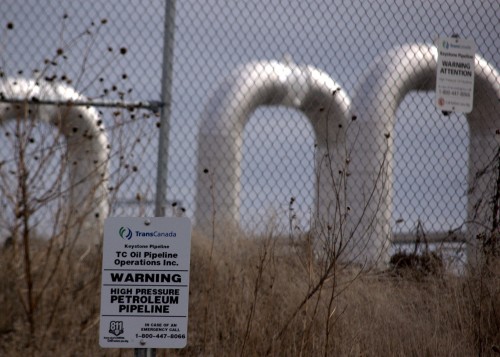
Whatever happens to the Keystone Pipeline bill in Congress, it will have dramatic impacts on the economy, the environment, and society in general. For example, it is estimated to create over 42,000 jobs but also to greatly contribute harmful carbon dioxide emissions to the atmosphere. It has far reaching consequences that will affect much of the U.S. citizenry, and it precisely this reason that has made it one of the most debated issues in politics today.
Q: What is a pipeline?
A: A pipeline is a commonly used structure for transporting things such as oil and natural gas. It usually runs underground over long distances.
Q: The Keystone Pipeline doesn’t exist yet…right?
A: It already does. The Keystone Pipeline already exists and what is still under debate is its proposed expansion, the Keystone XL Pipeline. The beginning of the pipeline starts in Alberta, Canada’s oil and sand fields and ends in Oklahoma.
Q: How large is the proposed expansion?
A: The new Keystone Pipeline is estimated to involve almost 2,000 miles of new pipeline by adding a southern section and a section that will reach Kansas.
Q: What are the details of the expansion?
A: The southern section would connect Oklahoma to Texas. Oklahoma currently has a shortage of oil refineries, and there are many more opportunities available in Texas to process the oil and capitalize on its wealth. The section that reaches Kansas will pass through North Dakota in order to pick up some more crude oil on the way to its final destination. Oil extraction is currently booming in North Dakota. At peak capacity, the pipeline is estimated to deliver over 800,000 gallons of oil every day.
Q: Who proposed it?
A: TransCanada, a Canada – based corporation, initially applied for it and applied for a permit to start construction in 2008. It is the primary energy operating infrastructure in North America.
Q: Who opposes it and why?
A: Environmentalists have been the the most vehement contrarians to the bill that would allow for construction. There are many oil and gas pipelines currently in use across the North America but none have been as controversial as the Keystone pipeline expansion. This is mainly because the expansion would extract oil from oil sands, an unconventional tactic. There are two ways of extracting the oil from the sands. The first method requires far more fuel and therefore more carbon emissions to literally pump the oil out of the ground. The second method involves strip mining and then heating the sand fields, which has already destroyed many acres of forest.
Q: Who is in favor of it and why?
A: The primary argument for the bill’s passage is that the expansion would be a massive job center. Specifically, it is estimated to create over 42,000 jobs over the two year construction period. About 4,000 of them would be directly involved in construction, and the rest would be indirectly involved in things such as food services. Also, the pipeline expansion is estimated to contribute over $3 billion to the American economy.
Q: Where is the proposition in the approval process?
A: It is usually the job of the State Department to approve international projects such as these and the President usually has the final say. However, the State Department’s review process halted last year after a Nebraska district court halted the governor’s decision to let the pipeline to pass through the state. Now, it is up to Congress to send a bill to President Obama’s desk if construction is to begin in the near future. However, the President remains resolute in his opposition to the expansion.
Q: How will the Keystone XL Pipeline affect me?
A: The biggest and most immediate effect of the expansion will be a dramatic change in oil prices. Many believe that the new additions to the pipeline will lead to a dramatic increase in gas prices due to a significant increase in supply. However, some critics of the expansion say that it will actually increase oil prices in different areas around the country. They cite that oil flow will be diverted from these areas in order to serve foreign markets. A 2011 report by Cornell University’s Global Labor Institute projected that the Keystone’s rerouting of oil from the Midwest would end up costing the region up to $4 billion in higher gas prices.
[slickquiz id=26]











